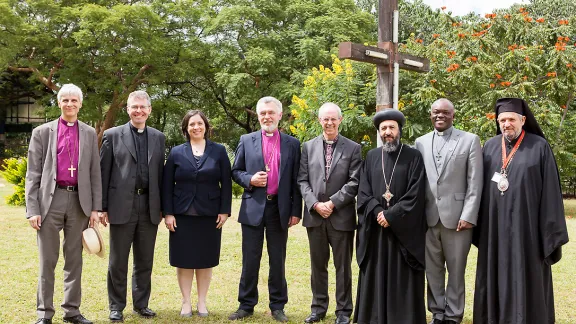
Lutheran Bishop Dr Matti Repo (far left) with other ecumenical guests at the 16th Anglican Consultative Council meeting in Lusaka, Zambia. Photo: ACNS
Finnish Bishop Repo encouraged by enthusiastic discussion at Lusaka meeting
(LWI) – Affirmation of the Lutheran-Catholic agreement on justification and a call for Anglicans to commemorate the 2017 Reformation anniversary were among ecumenical resolutions adopted by the Anglican Consultative Council (ACC) at its recent meeting in Lusaka, Zambia.
Bishop Dr Matti Repo of Tampere, Finland, who participated in the Anglican Communion’s governing body meeting in Lusaka, Zambia, mid-April says he was encouraged by the enthusiastic discussions on these issues “which both point to the grace of God and the free gift of salvation in Jesus Christ.”
Repo was at the ACC as an ecumenical guest representing The Lutheran World Federation (LWF). He presented the call to affirm the substance of the Joint Declaration on the Doctrine of Justification (JDDJ), which was signed by the LWF and the Roman Catholic Church in 1999. The LWF was also asking Anglicans to recognize the significance of the 500th anniversary of the Reformation which will be observed next year.
With this resolution, the Anglican Communion had underlined “salvation in Christ through faith as a central ecumenical conviction of Christian doctrine and expressed a further sign of our common will to be united in the catholic and apostolic tradition.
Speaking to Lutheran World Information (LWI), Repo said LWF’s theme for the 2017 anniversary, Liberated by God’s Grace, and the “not for sale” sub-themes on salvation, human beings and creation were “received with considerable interest, great enthusiasm and some participants found them very useful in their context.”
The governing body invited Anglicans to mark the anniversary by taking part in shared services, study, and mission activities with Lutherans and other ecumenical partners.
The ACC said it “welcomes and affirms the substance” of the JDDJ, which nullified centuries’ old disagreements between Catholics and Lutherans over the crucial subject of justification. The ACC resolution stated the shared common understanding by Anglicans and Lutherans that “we are made righteous before God only by grace though faith… and not on account of our works or merits.” It also recognized the 1986 statement on Salvation and the Church, in which Anglicans and Catholics declared their agreement on the essential aspects of the doctrine of salvation and the Church’s role in it.
By affirming the JDDJ, the Anglican Communion had underlined “salvation in Christ through faith as a central ecumenical conviction of Christian doctrine and expressed a further sign of our common will to be united in the catholic and apostolic tradition,” said Repo, bishop of the Tampere diocese of the Evangelical Lutheran Church of Finland.
Two Christian World Communions have endorsed the JDDJ after it was signed in 1999, first Methodists in 2006 and now Anglicans in 2016.
The unity of the Church
Rev. Canon John Gibaut, director for Unity, Faith and Order at the Anglican Communion Office, said endorsing the resolutions “is a way of showing our support to both Roman Catholics and Lutherans in 2017. It is a small way of contributing to the unity of the Church that was so wondrously advanced in 1999 in the JDDJ.”
“What I heard from Anglicans, and read in the table group reports, was an appreciation for their support of the ACC-16 resolution, and that the JDDJ is not a closed Lutheran-Roman Catholic text, but one seeking wider and wider reception,” Gibaut added.
A more formal, public and celebratoryAnglican-Lutheran reception of these decisions is anticipated in 2017, in the presence of both Lutheran and Roman Catholic representatives. The ACC also encouraged Anglican churches in other regions to explore ways of deepening relationships with LWF member churches in a formal theological way following the guidelines offered in the 2012 Anglican-Lutheran International Commission report To Love and Serve the Lord.
The Anglican Consultative Council facilitates the co-operation of the churches of the Anglican Communion. It advises on the organization and structures of the Communion, and seeks to develop common policies with respect to the world mission of the Church, including ecumenical matters. The Anglican Lutheran dialogue at international level dates back to the 1970s, and is currently conducted through the Anglican-Lutheran International Coordinating Committee.
In 2017, Lutherans and Catholics will mark 50 years of ongoing dialogue, which they elaborate in their recently produced document From Conflict to Communion.


